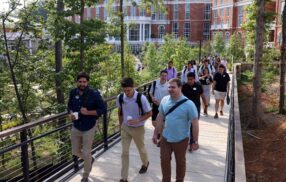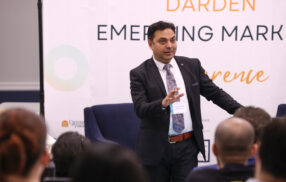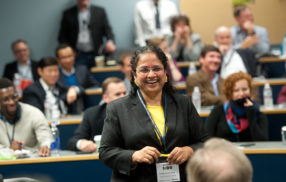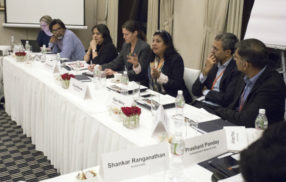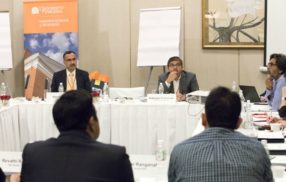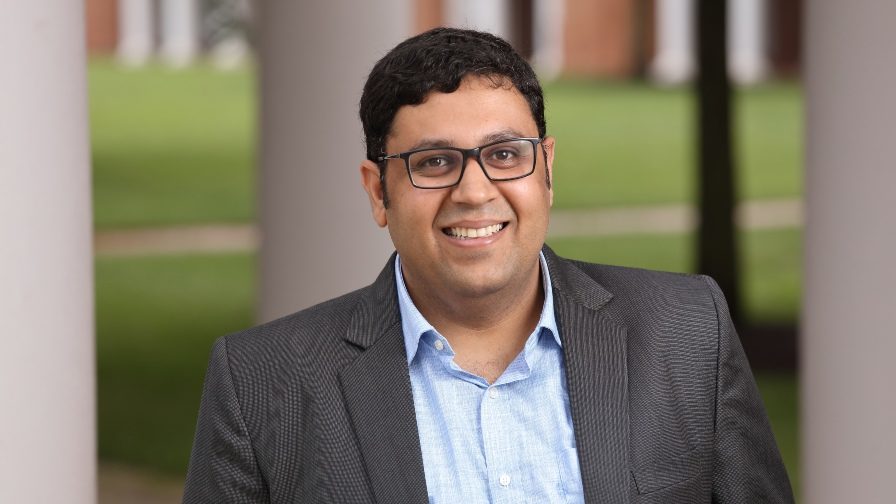
UVA Darden Professor: COVID-19 Crisis Makes Need for Structural Reforms in India Acute
By Dave Hendrick
COVID-19 has impacted India in ways both familiar and mysterious. Familiar, as the pandemic has caused intense economic hardship and led to significant societal tumult, and mysterious, as a feared cataclysm of cases never fully materialized.
University of Virginia Darden School of Business Professor Gaurav Chiplunkar detailed the unusual case of an Indian COVID-19 crisis that thus far has been far less deadly than feared while sharing insights on the current state Indian economy during the Asia Business Club’s Asia Week.
Showing a series of headlines from international news outlets warning of impending catastrophe, Chiplunkar said much of the world seemed “very concerned about how COVID was going to wreak havoc in the country.”
Instead, cases began to fall sharply in September, and feared “super-spreader” events such as Diwali or the large protests over agricultural reforms have so far failed to lead to a feared spike in cases and deaths.
The country had reported roughly 155,000 deaths related to COVID-19 as of 10 February, a significant sum, but one that puts the country far lower than much of Europe and North and South America on a per capita basis, according to data from Johns Hopkins University.
“Everyone is trying to understand what happened in India,” said Chiplunkar, who teaches the “India in the World Economy” elective in the Darden MBA program.
While no explanation has been proven conclusively, the Darden professor said, anecdotally, many have cited a particularly effective and well-enforced lockdown, a hot and humid climate, and the fact that more than half of the population is less than 25 years old, among a host of possible reasons.
While the toll on human suffering has been less than initially predicted, the impact on the economy has been dramatic, Chiplunkar said, with a contraction of 8–10 percent in gross domestic product (GDP) in 2020. Workers across demographic groups are reporting a decline in economic prospects, especially daily wage workers and small business owners.
Moreover, the country’s large fiscal deficit, which currently exceeds 7 percent of GDP, has severely limited the capacity of the government to respond to the pandemic. For example, even though a fiscal stimulus of roughly 10 percent of GDP was announced, it was structured to ease the fiscal burden of the central government, while instead pushing the spending to state governments.
“We really need deep structural reforms more than corrective policies,” said Chiplunkar.
The Darden economist said that key areas of reform should include a focus on social safety nets for the urban poor, consideration of whether India’s growth should be export-led or focused on its domestic market, and how controversial agricultural reforms should be complemented with efforts to jumpstart domestic manufacturing.
“India’s economy is in a crisis, and there is no denying it,” Chiplunkar said. “There is a need to understand the structural restraints and reform policies, rather than simply rely on corrective short-term fiscal and monetary policies.”
In addition to Chiplunkar’s presentation, Asia Week included sessions on opportunities in China’s health care market, a special edition of Darden Stories — a forum for community members to learn from each other — and screening of the documentary American Factory, among other events.
The University of Virginia Darden School of Business prepares responsible global leaders through unparalleled transformational learning experiences. Darden’s graduate degree programs (MBA, MSBA and Ph.D.) and Executive Education & Lifelong Learning programs offered by the Darden School Foundation set the stage for a lifetime of career advancement and impact. Darden’s top-ranked faculty, renowned for teaching excellence, inspires and shapes modern business leadership worldwide through research, thought leadership and business publishing. Darden has Grounds in Charlottesville, Virginia, and the Washington, D.C., area and a global community that includes 18,000 alumni in 90 countries. Darden was established in 1955 at the University of Virginia, a top public university founded by Thomas Jefferson in 1819 in Charlottesville, Virginia.
Press Contact
Molly Mitchell
Associate Director of Content Marketing and Social Media
Darden School of Business
University of Virginia
MitchellM@darden.virginia.edu



